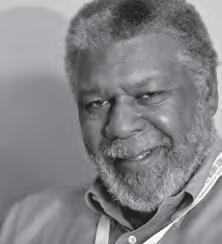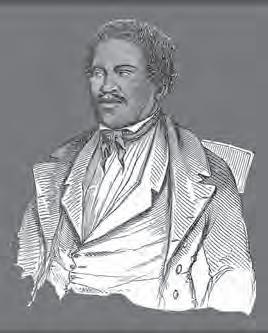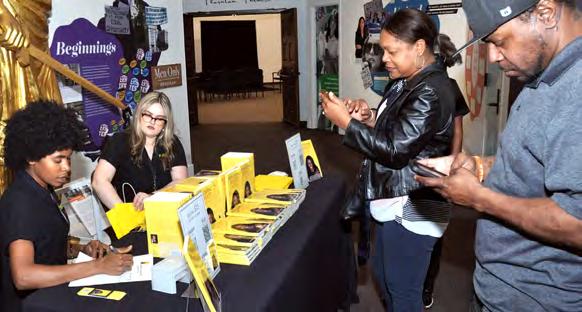
5 minute read
Big Business Must Stop Taking Big Tobacco Money
By Dr. Phillip Gardiner Co-Chair, African American Tobacco Control Leadership Council
It’s hard to believe that with the amount of damage that the tobacco industry has in icted on the Black community, that there are still Black organizations accepting their funding. By doing so, these Black organizations enable the tobacco industry to portray themselves as allies to our community. ey help silence our voices and e orts aimed at encouraging policymakers to take speci c steps to protect our people, thus becoming complicit in our death and disease. e problem with accepting these funds is the tobacco industry has a history of targeting and exploiting vulnerable communities, especially Black communities, through predatory advertising and marketing tactics. Our people must be aware that accepting money from the tobacco industry contributes to the ongoing exploitation of our people through their predatory practices of marketing menthol cigarettes and avored cigars.
e African American Control Tobacco Council is calling on Black organizations to be united in our ght against Big Tobacco and help save Black lives. Tobacco companies are actively opposing public health measures aimed at protecting Black Americans from the harm caused by their products.
The Backstory
A 1953 study by Roper, B.W. found that only 5 percent of African Americans smoked menthol cigarettes. A 1968 poll of People’s Cigarette Smoking Habits and Attitudes by Philip Morris showed that menthol use among Blacks had almost tripled to 14 percent. A report by Brown and Williamson in 1978 found that it had tripled again to 42 percent. By the 2000’s, over 80 percent of Black smokers used menthol cigarettes. Today, 85 percent of Black adults and 94 percent of Black youth who smoke are using menthol products. ese striking statistics arise from the success of the industry’s predatory marketing of these products in our community, where there are more adver- ere was no price to be put on the nal moments he would ultimately ever spend with his wife, Nancy, and their children, who were sold on the auction block while he worked.

Henry “Box” Brown knew it could lead to a lashing, but it would be worth every drop of blood.
“My agony was now complete, she with whom I had travelled (sic) the journey of life in chains, for the space of twelve years, and the dear little pledges God had given us I could see plainly must now be separated from me for ever, and I must continue, desolate and alone, to drag my chains through the world,” recounts Brown in his autobiography, the “Narrative of the Life of Henry Box Brown.” e year was 1848. And in a nal act of resistance, a nal act of love, Brown did the only thing he could do: he walked side-by-side with his wife, holding her hand as she moved closer to her fate on a North Carolina plantation.
“I went with her for about four miles hand in hand, but both our hearts were so overpowered with feeling that we could say nothing,” recounts Brown. “And when at last we were obliged to part, the look of mutual love which we exchanged was all the token which we could give each other that we should yet meet in heaven.”
Brown would go on to become known around the world as the formerly enslaved man who “mailed himself to freedom.” And while he never laid eyes on his family again, the love of his children and his wife is palpable to this day.

I o en wonder why people shy away from the stories that come from the period of chattel slavery in American history.
Is it troubling to read how our ancestors were brutally enslaved and transported during the Atlantic Slave Trade? Absolutely. Is it hard to watch Brown’s skin split under the crack of a whip on screen? Without a doubt. But woven through the tales of horror are unmatched sto- tisements, and most disturbingly, menthol cigarettes are cheaper compared to other communities. In 2022, the use of cigarettes, cigars and cigarillos was highest among Black youth. ese practices, coupled with buying the silence of some Black spokespersons for the past 50 years, have led to Black Americans dying disproportionately from heart attacks, lung cancer, strokes and other tobacco related diseases.
The National Museum Of African American History And Culture
Across this country, tobacco companies are vigorously opposing public health policies that would protect Black Americans from these products, speci cally the proposed FDA ban on menthol products. ese same companies continue to strategically provide monies to Black institutions to create the illusion of being socially responsible and invested in our well-being. Black institutions must reject funding from or any form of partnership with tobacco and vaping companies and hold them accountable for the harmful e ects they’ve had and continue to have on public and mental health, the environment and social justice.
ries of bravery, perseverance, persistence, and, yes, even love.
Time and time again, we see this repeated throughout history — the courage of love, men and women risking their lives and even paying the ultimate price — to ful ll the basic human needs of connection and intimacy.
e Library of Congress went to extensive lengths during the 1930s to record personal accounts of slavery in America from the mouths of the people who survived it. “Slave Narratives: A Folk History of Slavery in the United States From Interviews with Former Slaves” includes beautiful stories that show how love ourished during some of the darkest periods of American and human history.
“Hit wus in de little Baptist church at Neuse whar I fust seed big Black Jim Dunn an’ I fell in love wid him den,” reckoned Lucy Ann Dunn, of Raleigh, N.C. “He said dat he loved me den too, but hit wus three Sundays ‘fore he axed ter see me home.”
Dunn was 90-years-old when she told her love story on Aug. 4, 1937. What began as love at rst sight bloomed into a courtship.
“He come ever’ Sunday fer a year an’ nally he proposed. I had told mammy dat I thought dat I ort ter be allowed ter walk ter de gate wid Jim an’, she said all right i en she wus settin’ dar on de porch lookin’.”
Her love story takes place just two years a er gaining her freedom. I o en wonder what the ancestors would think of today’s “relationship goals.” e National Museum of African American History and Culture is one of those institutions. ey currently list Altria as a member of their Culture’s Corporate Leadership Council. It should be noted that Altria owns a 35 percent stake in JUUL Labs, the e-cigarette company that malevolently popularized e-cigarette usage among America’s youth. We are calling upon the museum to divest their funding portfolio of all tobacco industry contributions moving forward. e museum undertakes highly commendable work to document African American life, history and culture. However, we must bear in mind that American history is forever interwoven with the enslavement of African people on tobacco plantations. Unfortunately, traces of that exploitation continue to exist to this present day, principally taking the form of marketing menthol cigarettes and avored little cigars in the Black community. e museum is not alone, it is only one example, and we are challenging all Black organizations currently accepting funding from the tobacco industry to divest.
At a time when so many had their relationships controlled, many dared to love who they wanted — an act of de ance punishable by death. I o en fear we take so many things for granted — the right to unabashedly love who we want being one of them.
During this month of owers, chocolates, teddy bears, and whispered sweet nothings, I say let’s not forget those who went before us and dared to engage in one of the ultimate protests: the revolutionary act of Black love.
Alexis Taylor is the Managing Editor of the AFRO.
See BIG BUSINESS page 16









